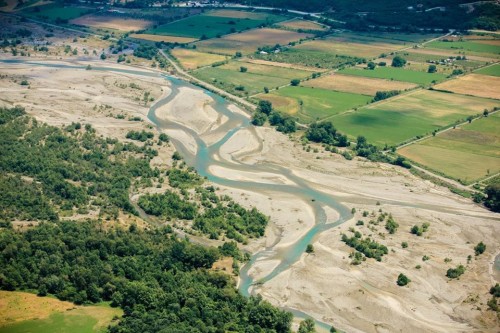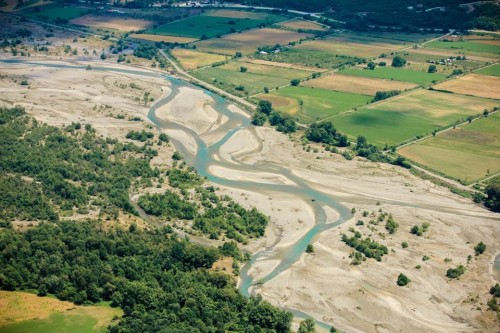By Besar Likmeta/ BIRN
On July 29, 2015, the Council of Ministers approved a bond of 8 percent of points for the Turkish company Çinar-San Hafriyat Nakliyat Inşaat Turizm Sanayi Ve Ticaret Limited Company, in the procedure of granting the Poçem hydropower plant concession on the Vjos River.
The decision that was published in the official notebook dated August 10 paves the way for the construction of a second hydropower plant after Kalivaçi on the Vjosë river, a construction which is strongly opposed by local and foreign environmental organizations, as well as by the European Parliament.

The decision taken by the government in July also contradicts the commitments made by Prime Minister Edi Rama a month ago during the electoral campaign for the local elections, when he promised that no more hydropower plants would be built in Vjosa and that its valley would return to protected area.
“The Pocem hydropower plant is one of the 8 HPPs planned in Vjosa by the previous governments, which we have opposed since the beginning of our campaign as well as during the tour of meetings with the community of the Vjosa valley, although the contract in question it was just a plan,” said Besjana Guri, representative of Eco Albania, an environmental organization that lobbies for the preservation of the ecosystem in the Vjosa valley.
“Now that this is concretized in the government’s decision, at a time when the prime minister himself has declared that work is being done to declare Vjosa a National Park, we are facing a very contradictory situation,” Guri added.
During a meeting in Tepelena during the electoral campaign for the local elections on June 13, Prime Minister Edi Rama said that the government would stop the plans for hydropower plants on the Vjosa river, orienting the economy of the area from family tourism by declaring the valley a national park.
“We will transform the valley of Vjosa into a national park to prevent barbarization by hydropower plants and to develop tourism, economy, agriculture, to strengthen the family economy by increasing the number of visitors to this large park of Vjosa,” said Rama.
“Vjosa is one of the most beautiful rivers and with the most interesting features in Europe, it is a great European asset. We, in cooperation with interested international organizations, will implement the Vjosa project in a National Park,” he added.
270 kilometers long, the Vjoses River is considered one of the last wild rivers in Europe, flowing naturally and undisturbed from its source in Greece near the village of Vouvoussa to its mouth in the Adriatic Sea.
“What makes it unique is the very fact that it flows uninterrupted from the source to the estuary and the construction of even a dam would ultimately destroy this extraordinary wealth of nature,” said Guri.
“The Vjosa National Park would be the first national park of a wild river in Europe which, in addition to preserving biodiversity, would ensure a sustainable development for the inhabitants of the Vjosa valley,” she added.
According to Eco Albania, the hydropower plants planned to be built on the bed of Vjosa on both sides of the border pose a serious threat to its ecosystem.
According to the environmental organization, a total of 38 HPPs are planned in the Vjosa catchment.
On the Greek side of the watershed, 6 new dams are planned, while there is only one existing one, the large HPP of Pigai.
In Albania, 8 dams are planned in the main stream, while the other 23 HPPs are designed in its branches – 4 of which have already been completed, while 4 others are under construction.
Poçemi HPP is the second dam after Kalivaç approved by the Albanian government in the main stream of Vjosa.
The construction of the HPP in Vjosa and its branches is not only opposed by environmental groups, but also by the European Parliament.
Through a resolution approved on April 22, MEPs ask Albania “to review the plans to build hydropower plants on the Vjos River and its tributaries, because they would damage one of the last intact ecosystems in Europe.”
“Vjosa has been described by international experts as the last “wild” river in Europe, declaring it a National Park would protect the integrity of this unique river in Europe,” Guri said.
“We continue to believe that declaring Vjosa a National Park means not accepting any dam in its entire watershed and we will continue to strongly support the community in opposing the construction of HPPs in Vjosa,” she concluded.
To go to the original article click here (in Albanian)








